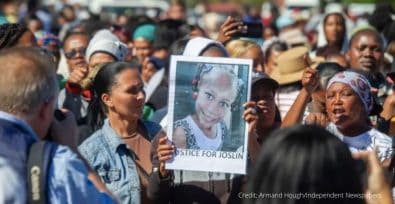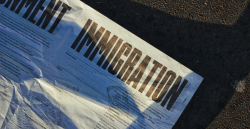Trafficking survivors have reported being forced to choose between buying food and maintaining mobile data packages so that they can access the digital platform to prove their right to work and rent a property in the U.K.
The digital divide
Digital platforms for migrants to prove their immigration status are becoming increasingly common around the world yet, the UN has been clear in its warning that this risks excluding marginalized groups who may struggle with digital literacy.
For trafficking survivors who can’t access the required digital platform because they may not have access to the internet or due to language barriers, they are put at risk of having to accept exploitative work where ID checks aren’t required.
Some refugees have reported technical errors that have failed to generate the code required to prove their right to work. “We had clients who either had to stop working, or were offered a job but because of code problems their potential employer actually had to withdraw the offer,” said Kama Petruczenko, a policy and research officer at the Refugee Council, offering support to refugees in the U.K.
Resorting to informal arrangements
As a result, informal arrangements become the only viable options available to people whose only way of proving their immigration status is via a digital platform. In these informal arrangements, the risk of exploitation and trafficking increase.
Mischa Macaskill who oversees the employment support program at UK anti-trafficking charity, City Hearts, explains “If you put in all these obstacles, the easier option would be to accept a flat where there isn’t a contract. It just increases the vulnerability, which ultimately could lead to them being exploited.”
The Thomson Reuters Foundation reports:
About 6% of British households do not have access to the internet at home because they cannot pay for broadband, do not own a phone or laptop, or have poor digital skills, said a March report by Ofcom, which regulates UK communications services.
For many refugees and trafficking survivors, data is simply a luxury while they rebuild their lives in a country grappling with soaring food and energy bills, in a cost-of-living crisis triggered by the Ukraine war and COVID-19.
The U.K. interior ministry has said it intends to phase our physical identification documents by 2024, an alarming prospect given the digital inequality that is already creating barriers for trafficking survivors to find housing and employment – both key elements to rebuilding their lives and building resilience against re-exploitation.
Being able to easily prove the right to work should be part of genuine anti-trafficking policies that facilitate survivors’ recovery. Sign the petition calling for safe migration for all.







Freedom United is interested in hearing from our community and welcomes relevant, informed comments, advice, and insights that advance the conversation around our campaigns and advocacy. We value inclusivity and respect within our community. To be approved, your comments should be civil.